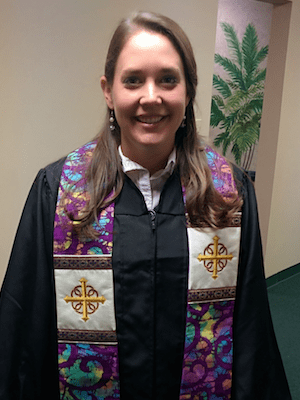I grew up a fundamental evangelical in the Bible Belt.
So often these two terms are lumped together that it’s hard to separate the impact of each on rhetoric and beliefs.
I have to admit that I didn’t know that I was fundamental when I was growing up. The strict adherence to a literal interpretation of Scripture wasn’t up for debate. It was the right way to interpret Scripture and the only way to interpret Scripture.
There wasn’t room to question biblical interpretation on homosexuality, women in ministry and divorce because the presupposition was there was only one right interpretation. This was the fundamentalism part of my childhood identity.
Beginning in elementary school, I learned tactics to share the plan of salvation with people I met.
We made bracelets with the plan of salvation and craft with the “Roman Road” in order to “always be ready to give an answer for the hope that we have.” (1 Peter 3:15).
Our main purpose in life was to bring others to Jesus Christ and to our community of right belief. This was the evangelical part of my childhood identity.
When fundamentalism and evangelism intersect, something new is born. Instead of just believing in the literal interpretation of the Scripture, my purpose and calling as a fundamental evangelical is to convert every person I meet to these right beliefs.
This plays out in very dangerous ways. If I meet a person who is a member of the LGBTQ community, I must not miss the opportunity to tell him or her what the Bible says about homosexuality.
If I meet a woman who is a minister or who is called to preach and pastor, I must not miss the opportunity to tell her what the Bible says about a woman’s role in the church.
If I meet a person who is considering divorce, I must tell him or her what the Bible says about divorce, no matter the situation even if abuse is involved.
Dogmatic beliefs don’t allow exceptions, questions or varied interpretations. To allow exceptions would be to admit another possibility exists; that would break down the very foundation upon which fundamentalism is built.
In sharing my journey of coming out as a Baptist preacher who happens to be a woman, I hear again and again stories of individuals who have been caught in the crosshairs of fundamentalism and evangelism.
I hear their stories of spiritual abuse and pain. I cry with them as they cry. I hold their anger and confusion as to how someone can treat another human being who holds the divine breath within them with such condemnation and disdain.
And the implications for this intersection aren’t just in the religious realm.
If you are anywhere in the South during college football season, it’s easy to tell the impact of fundamental and evangelical rhetoric outside of the church.
People shout and even come to blows trying to convince each other that one team is better than the other, not able to see that room exists for devotion to more than one team.
This is one nonreligious expression of people seeking to convince (evangelize) others about the rightness of their fundamental beliefs.
We may chuckle at the devotion, but it’s a symptom of a disease that is infecting our culture and our churches.
A disease that is blinding us to the humanity of the people we encounter. That disease is we don’t see each other as fellow humans.
We don’t see each other as humans. We see each other as teammates or enemies. Our enemies must be defeated or converted. Fundamental evangelism allows no other way.
It is only when we begin to see each other and hear each other again that we will be able to move forward toward the beloved community Christ Jesus began so long ago.
A community where we don’t cling to our own beliefs, but instead, we, like Jesus, give up everything.
Pastor of Garden of Grace United Church of Christ in Columbia, South Carolina, and editor-in-chief of Harrelson Press Publishing.


